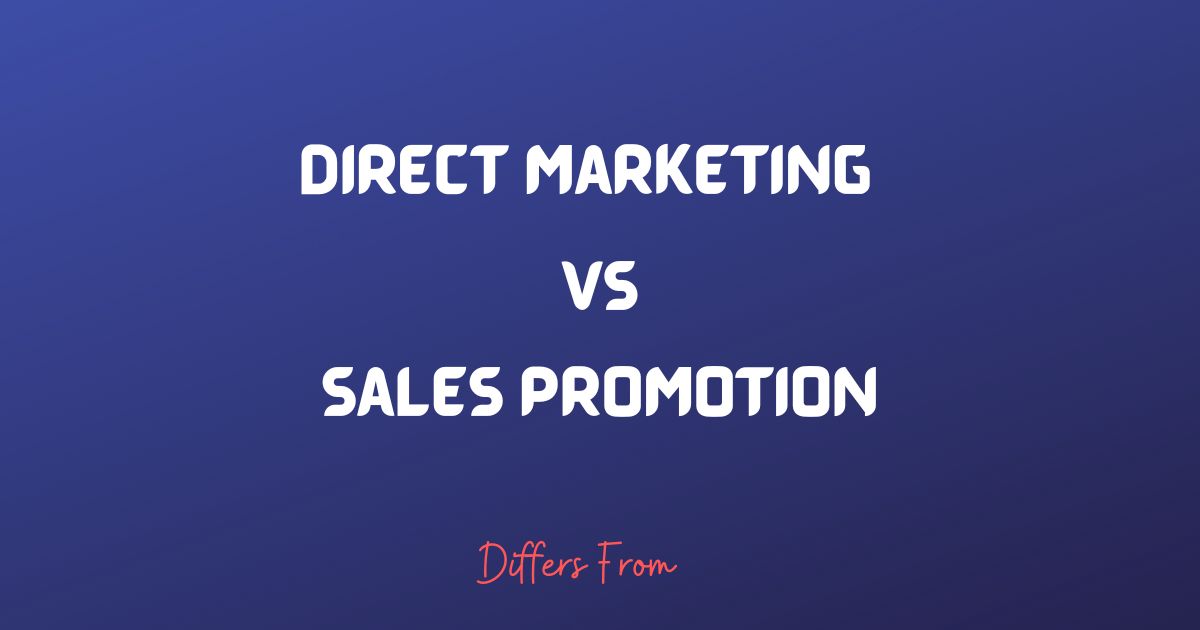In the world of marketing, understanding the nuances between direct marketing and sales promotion is crucial. This blog delves into these strategies, shedding light on their differences and helping you make informed choices to boost your business’s success. Discover the unique advantages each approach offers and how to harness them effectively in your marketing campaigns.
Difference between direct marketing and sales promotion
| Direct Marketing | Sales Promotion | |
| Establishes | Direct communication with potential customers. | Utilizes short-term tactics to stimulate immediate sales. |
| Focuses | Focuses on personalized messaging and relationship building. | Focuses on creating urgency and incentivizing purchases. |
| Utilizes Channels | Email, direct mail, telemarketing, and targeted advertising. | Store displays, advertising, and digital platforms. |
| Aims | Generate immediate sales and leads. | Emphasizes short-term sales spikes and immediate results. |
| Long-term Customer | Customer engagement and loyalty. | Creates excitement and visibility for products or services. |
| Brand Awareness | Seeks to create brand awareness and trust. | Often relies on limited-time offers, discounts, or giveaways. |
| Data-Driven | Utilizes data-driven approaches for targeting and measuring results. | Campaigns have specific start and end dates, with a temporary impact. |
What is direct marketing?
Direct marketing is a promotional strategy that involves directly communicating with potential customers to promote products or services.
It aims to generate a direct response or immediate sale through various channels like email, direct mail, telemarketing, or targeted advertising. The goal is to establish a personalized and interactive connection with the target audience.
What is sales promotion?
Sales promotion refers to the activities and techniques used to stimulate immediate sales of products or services. It includes strategies like discounts, coupons, contests, free samples, loyalty programs, and limited-time offers.
Sales promotion aims to encourage customers to make a purchase or take advantage of a special deal, often creating a sense of urgency or providing added value to incentivize buying.
Comparison between direct marketing and sales promotion
Direct marketing and sales promotion are both marketing strategies used to drive sales and promote products or services. While they share the goal of generating revenue, there are significant differences between the two:
Nature and Approach
Direct marketing focuses on establishing direct communication with potential customers. It aims to build relationships, create brand awareness, and generate immediate sales through personalized interactions.
Sales promotion, on the other hand, employs short-term tactics to stimulate immediate sales. It uses incentives, discounts, and promotional activities to encourage customers to make a purchase quickly.
Communication Channels
Direct marketing employs various channels like email, direct mail, telemarketing, social media, and targeted advertising to directly reach out to customers. It emphasizes personalized and interactive communication.
Sales promotion typically utilizes channels such as in-store displays, advertising, public relations, digital platforms, and point-of-sale materials to create awareness and drive sales. The focus is on creating a sense of urgency and attracting customers to take immediate action.
Objectives
Direct marketing aims to establish long-term relationships with customers, generate leads, promote brand loyalty, and increase customer engagement. It focuses on building customer trust and delivering personalized experiences.
Sales promotion aims to boost short-term sales by creating excitement, increasing product visibility, and driving customer demand. It focuses on generating immediate purchases and creating a sense of urgency.
Timing and Duration
Direct marketing activities are often ongoing and long-term in nature. They are designed to establish continuous communication and engagement with customers over time.
Sales promotion activities are typically short-term and have specific start and end dates. They create a temporary spike in sales by capitalizing on immediate customer response.
Scope
Direct marketing encompasses a broader range of activities beyond immediate sales, including lead generation, customer retention, database marketing, and personalized messaging.
Sales promotion is primarily focused on generating immediate sales and increasing short-term customer demand.
Pros of direct marketing
- Targeted Approach: Direct marketing allows businesses to target specific customer segments or individuals based on demographics, interests, or purchasing behavior.
- Personalization: Direct marketing enables personalized communication with customers, allowing businesses to tailor their messages and offers to individual preferences.
- Measurable Results: Direct marketing campaigns often provide measurable results, allowing businesses to track and analyze response rates, conversion rates, and return on investment.
- Cost-Effective: Compared to traditional mass advertising methods, direct marketing can be more cost-effective, especially when using digital channels like email or targeted online advertising.
Cons of direct marketing
- Intrusiveness: Some direct marketing methods, such as telemarketing or unsolicited emails, can be perceived as intrusive or spammy by customers.
- Response Rates: Direct marketing campaigns may experience lower response rates compared to other marketing methods.
- Data Privacy Concerns: Collecting and utilizing customer data for direct marketing purposes raises privacy concerns.
- Limited Reach: Direct marketing campaigns may have limitations in terms of reach, especially when targeting niche markets or specific customer segments.
Pros of sales promotion
- Increased Sales: Sales promotion tactics can create a sense of urgency and incentive for customers to make immediate purchases, leading to a boost in sales volume.
- Customer Attraction: Well-executed sales promotions can attract new customers and encourage existing customers to engage with the brand or product, potentially expanding the customer base.
- Increased Brand Awareness: Sales promotions can generate buzz and increase visibility for a product or brand, attracting attention and creating awareness among consumers.
- Competitive Advantage: Effective sales promotions can give a business a competitive edge by offering unique incentives or deals that differentiate them from competitors.
- Inventory Management: Sales promotions can help businesses manage inventory by driving sales of excess or slow-moving products, allowing for better control of stock levels.
Cons of sales promotion
- Reduced Profit Margins: Offering discounts, incentives, or giveaways as part of sales promotions can reduce profit margins, especially if not carefully planned and managed.
- Diminished Perceived Value: Over-reliance on sales promotions may lead to customers perceiving the product or brand as constantly discounted or of lower value, potentially impacting long-term pricing strategies.
- Brand Dilution: Frequent or poorly executed sales promotions can dilute the brand image and positioning, making it challenging to establish a premium brand perception.
Conclusion
Direct marketing involves personalized communication to build relationships and generate sales, while sales promotion utilizes short-term tactics to drive immediate purchases. Direct marketing focuses on long-term engagement, while sales promotion aims for short-term sales spikes.
In conclusion, while both direct marketing and sales promotion contribute to driving sales, they employ distinct strategies and timelines. Direct marketing emphasizes personalized communication and building relationships, while sales promotion focuses on creating immediate purchase incentives.

